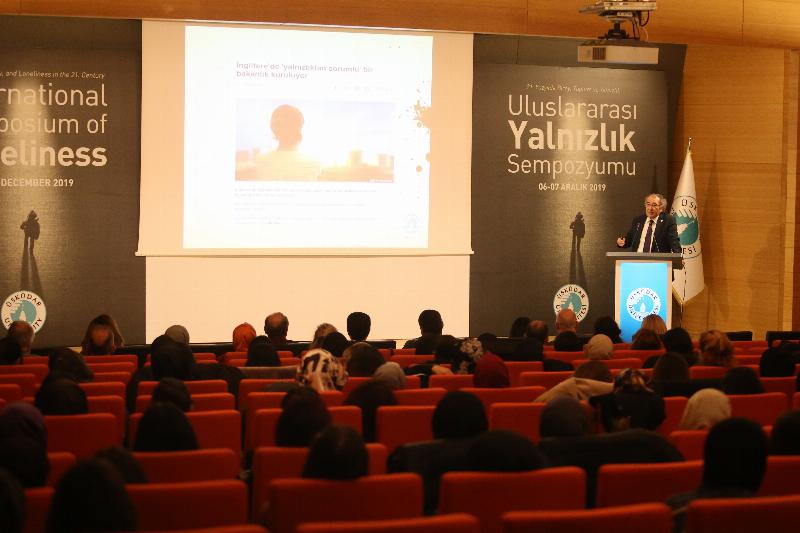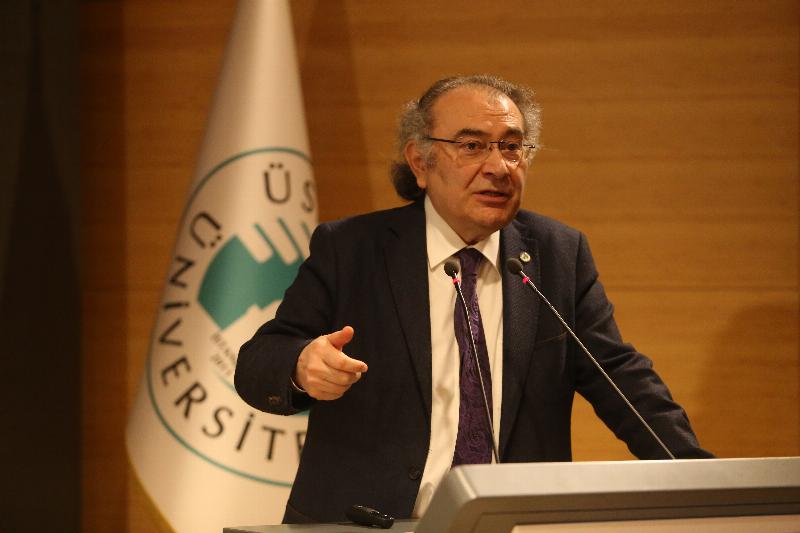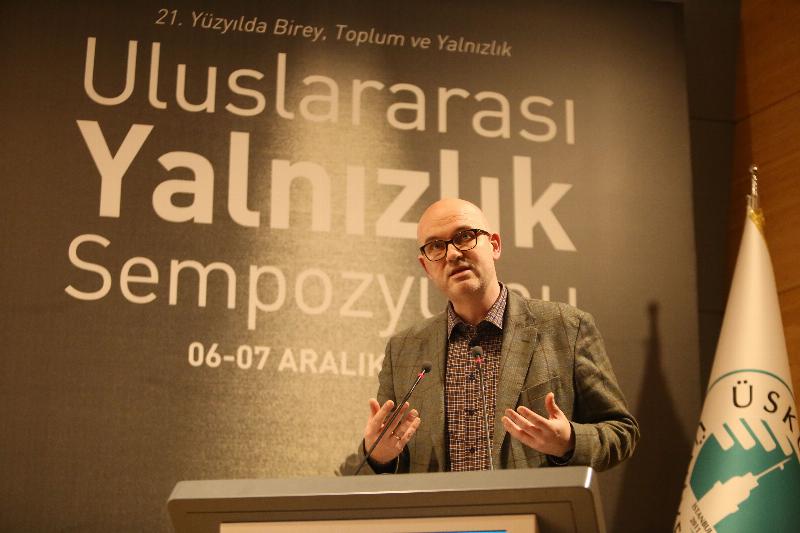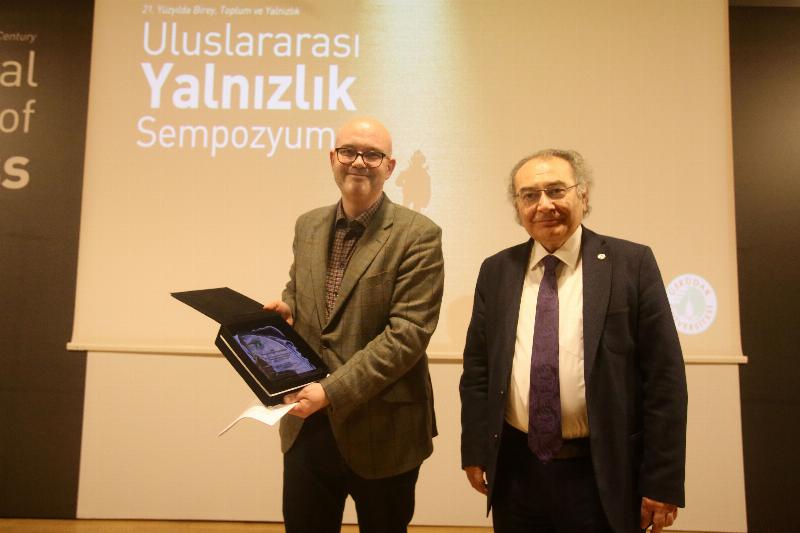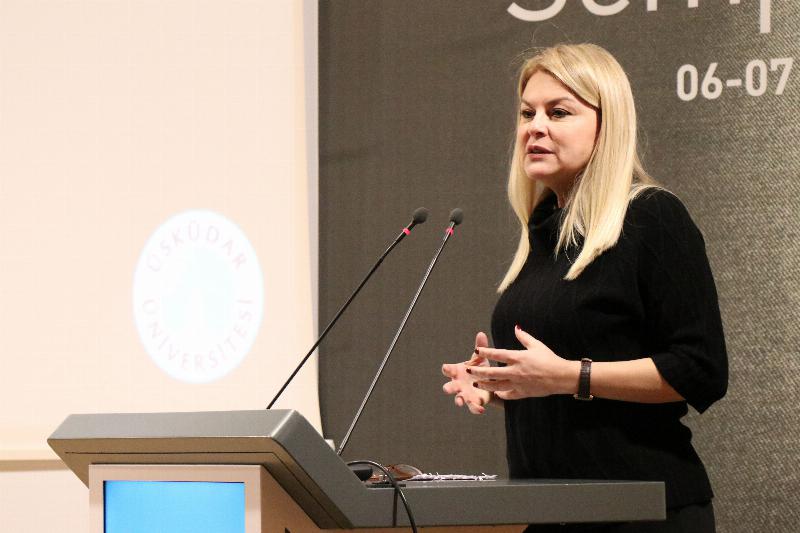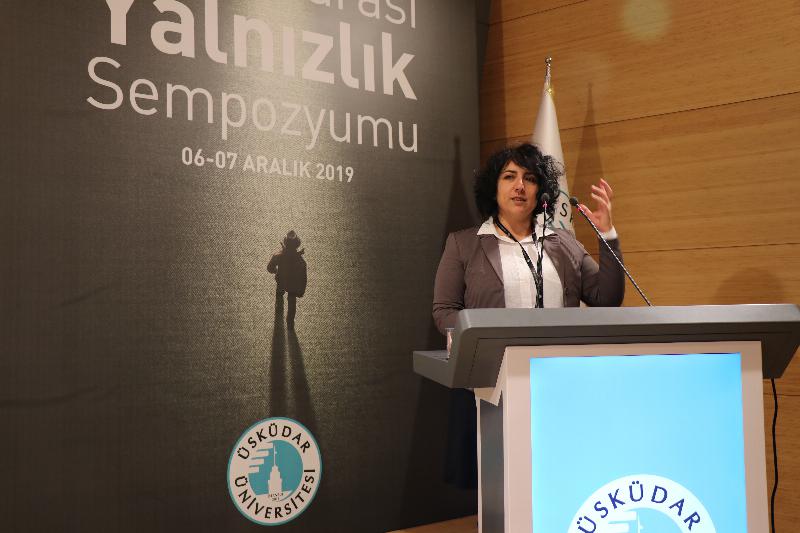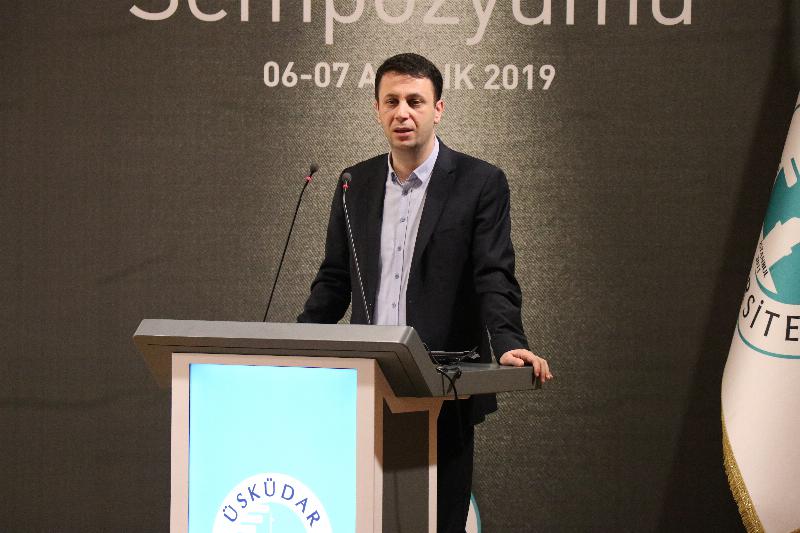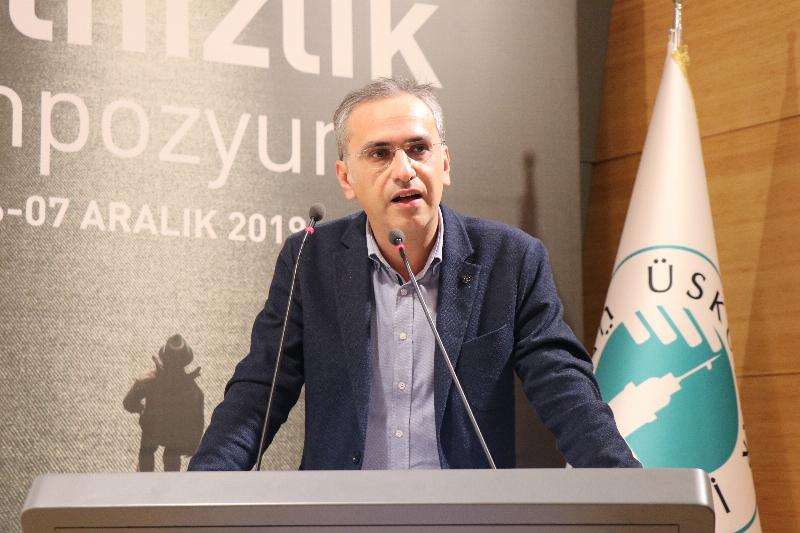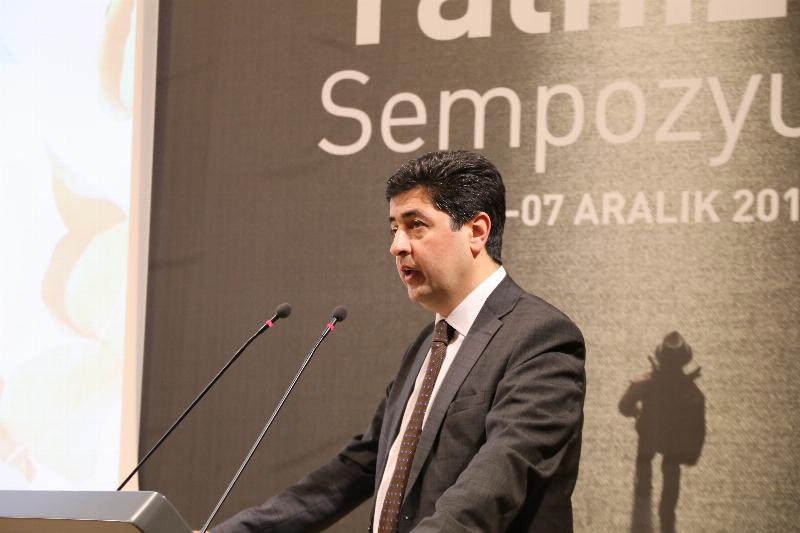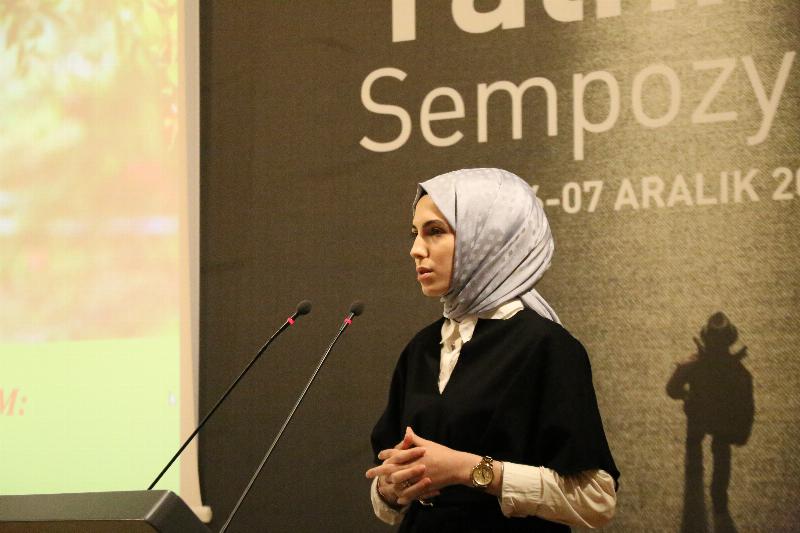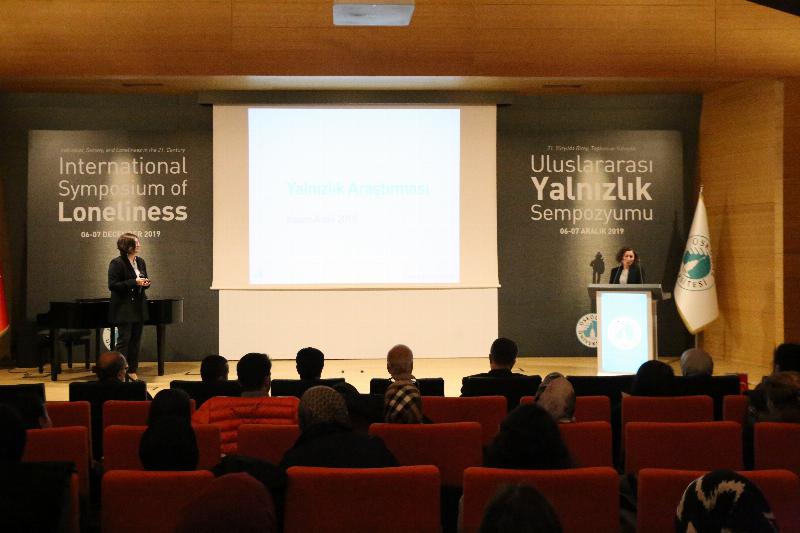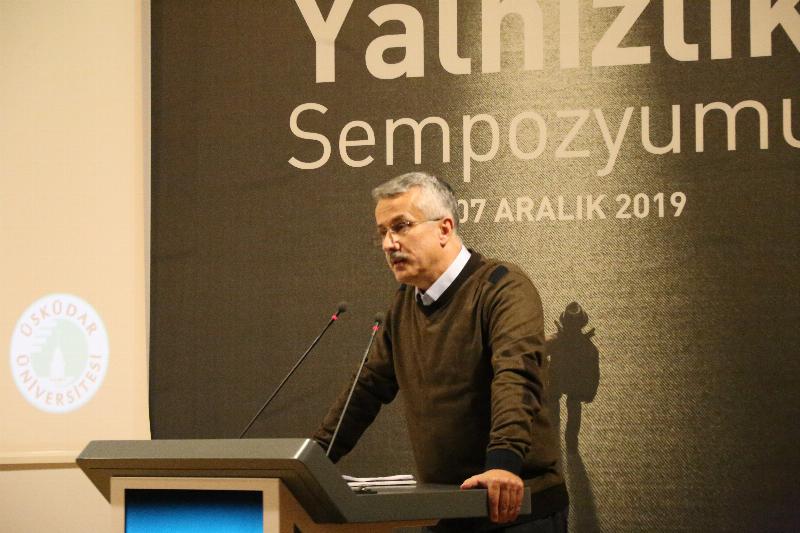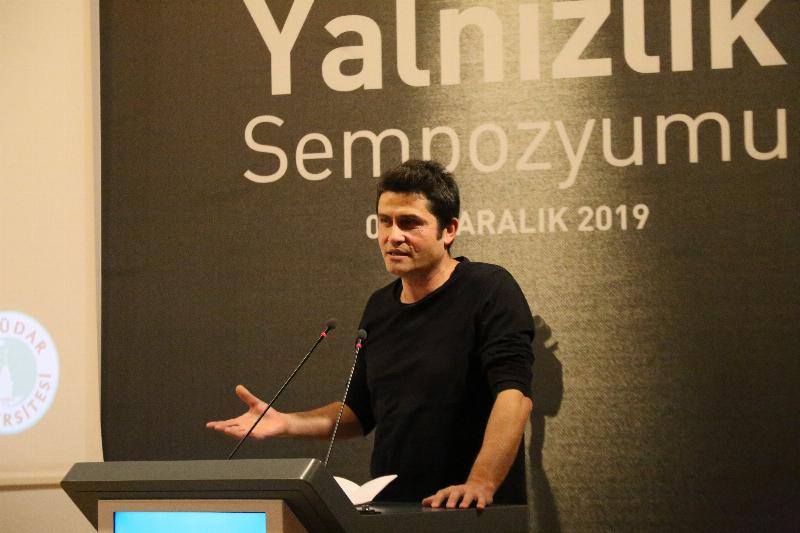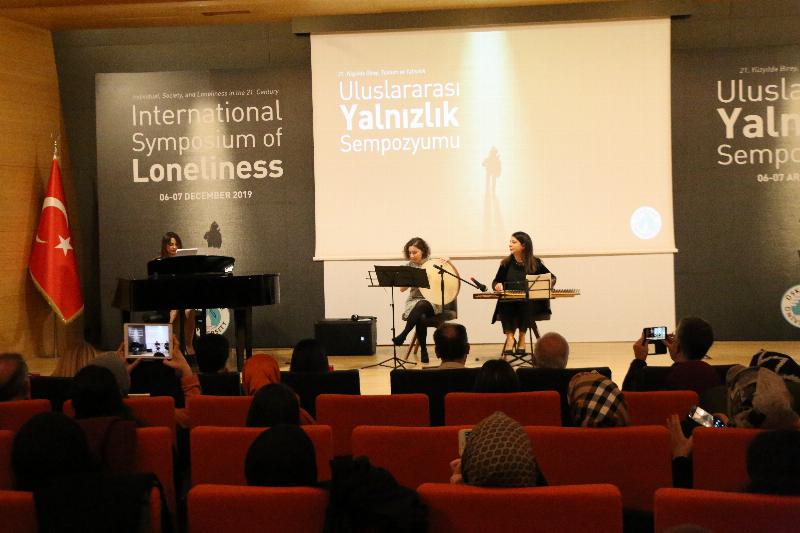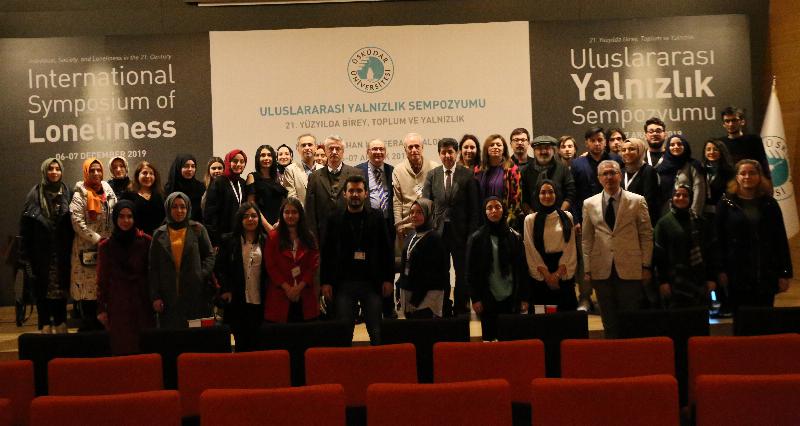The concept of “loneliness” was discussed in a multinational way at the International Symposium of Loneliness under the title of “Individual, Society and Loneliness in the 21st Century” which was organized by Üsküdar University. Prof. Nevzat Tarhan touched upon the psychological effects of loneliness on individuals and society. Prof. Tarhan said digital addiction is one of the reasons for loneliness. Prof. Tarhan mentioned that social isolation and psychological isolation in young people is too much, He said that studies in the world of loneliness among young people is higher than the elderly. Prof. Tarhan continued, “It is usually expected that loneliness increases with age. We now considered this as unreal. Youth and adolescence are the period of socialization. During this period, the young individual feels lonely. This poses a risk for the future of humanity.”
At the symposium held at the Nermin Tarhan Conference Hall of Üsküdar University Main Campus, “loneliness” was discussed as an individual concept with its results and social effects.
Prof. Ebulfez Süleymanlı: “Depressive loneliness is an individual and social problem.”
Üsküdar University Head of Sociology Department and Symposium Coordinator Prof. Ebulfez Süleymanlı stated that loneliness is not a new phenomenon, but is seen in the contemporary world, where individualization is very high. He continued as, “It even turns into a phenomenon that becomes quite ordinary in terms of some spatial and cultural structures. In this period, when face-to-face relationships are weakened, intolerance increases, social trust decreases and egos are inflated; therefore, depressive loneliness becomes a problem both individual and social. Scientific research indicates that loneliness is a serious risk for physical and mental health, especially mental health. On the other hand, loneliness alone is not a negative situation.” He also stated that the types of loneliness, which are defined as solitude and chosen loneliness, constitute an important environment for material and intellectual creation.
Prof. Nevzat Tarhan: “Most of the society feels lonely”
Üsküdar University Founding President Prof. Nevzat Tarhan touched upon at the opening conference titled “The Nightmare of Modernism” and the psychological effects of loneliness on the individual and society were discussed. He stated that loneliness in the world is an important issue in scientific research. Prof. Nevzat Tarhan said, “The fact that we cannot have a true friend despite hundreds of friends on social media is the reality of today. Although there is social and economic mobility, most of the society lives alone.”
Prof. Nevzat Tarhan: “40 percent of young people feel alone”
He pointed to the effects of loneliness on people with developing technology. Prof. Nevzat Tarhan shared that 8.5 million people are living alone in the country on the UK and the work on the establishment of "the Ministry of Loneliness" is an ongoing process. Manchester University in the United Kingdom and the BBC's joint 55 thousand people participated in the study mentioned. Prof. Nevzat Tarhan stated that this study, called “the Anatomy of Loneliness”, is the largest in the world. He said, “According to the results of this study, the loneliness rate between the ages of 16-24 was determined as 40 percent. In advanced age, this rate is 27 percent. An inverse ratio came out from what it was affected. Youth and adolescence are the periods of socialization. It is a period that must be both family-dependent and free. During this period, the young individual feels lonely. These people will feel even lonelier after 40-50 years. Suicide rates are higher among these people.”
Prof. Nevzat Tarhan: “People with low social confidence feelings feel loneliness”
Prof. Nevzat Tarhan stated that according to the study, those who are exposed to discrimination feel lonely. He said, “Lonely people need more empathy. Their social trust feelings are low, more on-line friends. People with disability and health problems feel more loneliness.”
Prof. Nevzat Tarhan: “Social isolation in young people is too much”
Prof. Nevzat Tarhan stated that loneliness affects people spiritually. He said, “There are disorders such as schizophrenia, where loneliness and introversion are intense. There are schizoid type personality traits. It has avoidant personality traits. These people are alone in crowds. Social isolation and psychological isolation are very high among young people. Digital dependence is also one of the reasons for loneliness.”
Prof. Nevzat Tarhan: “Western countries live California Syndrome”
Prof. Nevzat Tarhan spoke of an attack by Timothy McVeigh in the US state of Oklahoma in 1995, which resulted in the deaths of 168 people. He noted that Western civilizations suffered from California Syndrome. He said, “This syndrome has symptoms such as hedonism, narcissism, alienation and loneliness, unhappiness. People with syndromes lack empathy, they don't like anyone, and if they have the power, they see themselves as the biggest.”
Prof. Nevzat Tarhan's advice for fighting loneliness
Prof. Nevzat Tarhan said that random favors should be done to combat loneliness. He said, “A person who says "I am alone, take care of me" is alone. However, if one says, ‘Let me take care of him alone,’ he would find it very friendly. This is the solution to loneliness. We just have to do random favor projects to help people. Random goodness projects relieve other people's loneliness. It may be useful to stay away from selfish people and get into social clubs. Make it your target to have a friend.”
Prof. Lars Fredrik Svendsen: “Loneliness is confused with being alone”
In the symposium, Norway’s Bergen University Department of Philosophy faculty member Prof. Lars Fredrik Svendsen delivered a conference on “Trust and Loneliness Policy”. Svendsen said that loneliness was an emotional response and he continued as, “t is important to keep in mind that loneliness is a feeling, because it is often confused with other phenomena, especially the concept of being alone. However, being alone and loneliness are two separate events. Both are logical and experience independent. We can define loneliness as a social retreat: A feeling of discomfort that tells us that our need for relationships has not been met. We can also describe it as a social pain.”
Eastern Europe and Northern Europe are the loneliest ones
Svendsen stated that some groups such as young people, aged 16-24, elderly, migrants and people with disabilities are more at risk than others. He said, “One of the key factors in the extent to which the individual feels lonely is the country in which the individual resides. This actually has more impact than age. In Europe, Eastern European citizens are clearly the loneliest. On the other hand, Northern Europeans are the least alone. There are also high rates in southern European countries such as Italy, Greece and Portugal, but not as high as Eastern Europe.”
The relationship between trust and loneliness is very strong
Prof. Svendsen pointed out that the hypothesis that individualization leads to a decline in confidence and an increase in loneliness is incorrect and stated the following:
“On the contrary, the opposite is true. So, one might ask why we did not see a significant increase in confidence and a decline in loneliness in the age of mass individualization. In essence, this is much more than a matter of individualization. When societies, both economically and ethnically, become less homogeneous, trust tends to fall. Economic crises disrupt trust and the like. The relationship between trust and loneliness is very strong. The relationship between both these phenomena and individualization is weak because many other factors play a role. Nevertheless, it is still important. If you want to fight insecurity and loneliness, you should aim to encourage, not reduce, individualization. You should promote education and aim for equality. People that are more educated have higher levels of confidence and lower levels of loneliness than those who are less educated. Individualism is essentially egalitarian, meaning that all individuals are identical. They are basically citizens, not members of families or groups.”
Prof. Arıboğan evaluated the political consequences of loneliness
In the afternoon session of the symposium, the concept of loneliness was evaluated from a political, philosophical and sociological point of view.
Üsküdar University Dean of the Faculty of Humanities and Social Sciences, Prof. Deniz Ülke Arıboğan delivered a presentation titled “Loneliness and Political Consequences”.
Assoc. Prof. Çiğdem Yazıcı: “Philosophy has long been a free and lonely figure”
Head of Department of Philosophy, Faculty of Humanities and Social Sciences Assoc. Prof. Çiğdem Yazıcı gave a presentation titled “Post-Truth, Truth and Loneliness”. Yazıcı mentioned that philosophy has long been a free and lonely figure. She stressed that loneliness has many meanings. Yazıcı said, “Philosophy is sometimes criticized about whether it reflects the current situation. There are things that can be constantly criticized within the Post-Truth.”
Asst. Prof. Oğuz Tan: “Loneliness shortens human life by ten years”
Faculty of Medicine Department of Mental Health and Diseases Asst. Prof. Oğuz Tan delivered a presentation titled “Durkheim, Founder of the Science of Loneliness”. Tan stated that loneliness is a medical condition in 2019. Tan shared that “Loneliness shortens human life by ten years.”
Asst. Prof. Oğuz Tan: “Religion is protective against suicides”
Tan mentioned the suicide rate according to the types of religion. He said religion is protective against suicide. Tan also shared, “The reason for preventing suicide is not religion's prohibition. It is the formation of the congregation.” Asst. Prof. Üyesi Oğuz Tan evaluated loneliness politically. He said that the ranks in the war are united against the common danger of all. He continued, “In such cases, the individual thinks of the society and not himself, so the suicide rate decreases.”
Assoc. Prof. Tayfun Doğan: “Loneliness is a virus, while being alone is a preference”
Üsküdar University Deputy Dean of the Faculty of Humanities and Social Sciences Assoc. Prof. Tayfun Doğan emphasized that according to the meta-analysis studies, loneliness affects the individual as badly as smoking 15 cigarettes per day. He compared loneliness to obesity. He stated that obesity could be less harmful besides loneliness. He said that loneliness and being alone are different situations. He continued with “Loneliness is a virus, while being alone is a preference.”
Assoc. Prof. Tayfun Doğan: “We complain about being alone, but we don't want people.”
Doğan encouraged listeners to establish quality human relationships and gave examples about loneliness from everyday life. Assoc. Prof. Tayfun Doğan said, “For example, we complain that we are alone but we do not want guests to come on weekends.”
Assoc. Prof. Barış Erdoğan: “It becomes a habit as the number of people living alone increases”
Üsküdar University Department of Sociology Faculty Member Assoc. Prof. Barış Erdoğan He gave a presentation titled “Solo Life in Modern Society”. Erdoğan said that as the number of people living alone increased, it became a habit. He underlined that the social security systems of Scandinavian countries are very strong and that people do not need family, relatives and community ties. For this reason, the Scandinavian countries are becoming lonelier and said that Turkish society is remembered with the traditional way of life. Erdoğan said, “According to TÜİG, Turkish society is now heading towards western similarity.”
Assoc. Prof. Barış Erdoğan: “Solo life increases in terms of the market”
Erdoğan said that living alone has a different status for society. He emphasized that solo life has increased in terms of the market, that individuals are buying different products such as food, and beverages and goods in their homes and this will affect sales positively. He also mentioned that young adults who embrace solo life are seen as new members of society who try to improve themselves. He said that they chose to live alone in women and men, and that women felt more confident in this way, and that men preferred to live alone with the elimination of the imposed home maintenance problem.
Prof. Veysel Bozkurt: “Those who use social media for less than 60 minutes feel at least alone”
In the first day of the International Loneliness Symposium organized under the title of Individual, Society and Loneliness in the 21st Century, the last speech was given by Prof. Veysel Bozkurt did. Bozkurt shared his research on “Measuring the Loneliness Scale of Social Media Users”. Bozkurt said, “In this research; students, housewives, unemployed, single, widows were involved. The survey was delivered to these people via Google survey.” Prof. Veysel Bozkurt mentioned that the use of social media is related to loneliness and shared the data obtained because of the survey. Bozkurt continued, “People who use social media for less than 60 minutes are those who feel at least alone.”
“As our loneliness increases, we look at social media and our loneliness increases”
Prof. Veysel Bozkurt said that as human loneliness decreases, he / she is connected to social media. He explained the connection between the use of social media and loneliness with an example. He said, “As we are lonely, we look at social media and feel more alone, as a very thirsty person tries to quench their thirst by drinking sea water, our loyalty increases our loneliness”.
Üsküdar University On the second day of the International Loneliness Symposium organized by the Department of Sociology, Faculty of Humanities and Social Sciences, valuable names shared important information about loneliness.
Üsküdar University Head of the Department of Sociology and Symposium Coordinator Prof. Ebulfez Süleymanlı delivered the opening speech of the second day of the event held in the Main Campus Nermin Tarhan Conference Hall.
Prof. Ebulfez Süleymanlı: “People need others to be able to grow”
Prof. Ebulfez Süleymanlı made his presentation on “Migration and Loneliness”. Süleymanlı made important explanations about the concepts of migration, immigrants, refugees and loneliness. Süleymanlı evaluated loneliness along with the issues of longing for migration and homeland. He said, “The sense of loneliness is basically the longing for the dorm that we stay outside or feel to return to. Today, more than 65 million people are refugees in the world. Most of those who are forced to migrate are under the age of 18. People may not be able to bear the burden of the trauma they experience at an early age. So are the refugees. Their events are not easy; they may not be able to cope alone. That is why one needs people in such situations. Just as a tree needs water to grow, so does a human being.”
Zeynep Sena Akdağ: “Every child is precious, the one for their mothers.”
After Prof. Ebulfez Süleymanlı’s presentation, Üsküdar University Department of Sociology 4th grade student Zeynep Sena Akdağ gave information about the “Pomegranate Model” project that she studied with Prof. Ebulfez Süleymanlı.
23% of young people feel lonely!
Üsküdar University Department of Sociology Asst. Prof. Tuğba Aydın Öztürk and Method Research Company Manager Hale Aslı Kılıç announced İstanbul and Loneliness research results. According to the results, ’23% of the young people feel lonelier, among the lonely people, 36% are unhappy and 45% feel neutral. Moreover, entrepreneurs and professionals are more likely to see loneliness as happiness. Those who work more intensively, such as workers and civil servants, feel unhappier. While those who are happy when they are alone are satisfied with individual activities, those who are unhappy when they are alone tend to sleep, eat, clean and close themselves at home.”
Asst. Prof. Zülfikar Özkan: “Loneliness depends on the person”
Üsküdar University Department of Sociology Asst. Prof. Zülfikar Özkan delivered a presentation titled “Can a lonely person be happy?” and explained the emotional effects of loneliness on people. Özkan shared, “Everything depends on how you are, and loneliness depends on the person.
Asst. Prof. Zülfikar Özkan: “Every embodied soul is doomed to loneliness”
Özkan noted that loneliness is related to happiness and genetics and being happy also depends on genetic factors. Özkan said, “Being happy depends on the genetic factors and living conditions at a certain level in the hands of a person at a rate of fifty percent. Loneliness and being alone should not be confused. Only man cannot be happy, but every embodied soul is doomed to loneliness. Here we must balance the individual and belonging.”
Asst. Prof. Aylin Tutgun Ünal: “We must try to understand the generations socially”
Üsküdar University Department of New Media and Journalism Asst. Prof. Aylin Tutgun Ünal gave information about today's generation studies in her speech titled “”Loneliness and Generations” and emphasized that we need to understand the generations socially.
Ünal shared about the scale they have developed about generations. Ünal drew attention to the following statements about the scale: “The Acceptance of Differences Scale includes the acceptance and prejudices of individuals with different religious / ethnic belonging, different external appearances and thoughts and life values in environments such as work and family environment. Thus, the difference acceptance scale consists of three sub-scales. When the acceptance levels of the differences were examined, it was found that generation Z is the lowest tolerance for different religious / ethnic structures. In fact, except for the X and Y generations of the Z generation, even the Baby Boomer generation has significantly lower acceptance levels.”
Dr. Recai Yahyaoğlu: “Loneliness is the dungeon of modern minds, the freedom of primitive minds”
Researcher-Author, Medical Doctor Dr. Recai Yahyaoğlu gave a presentation titled “Psychology of Loneliness” and talked about the definition of loneliness. Yahyaoğlu stated “The definition of loneliness varies from person to person and may also vary according to the mood of the person. Loneliness should not be confused with being alone. Loneliness is not that no one is with the person. Loneliness is correlated with depression. Loneliness is harmful to mental health because it melts the feeling of belonging. Loneliness is the dungeon of modern minds, the freedom of primitive minds.”
Author Selahattin Yusuf: “Loneliness begins with the emergence of modern cities”
The other speaker of the symposium was Author Selahattin Yusuf. Yusuf delivered a presentation titled “Literature and Loneliness” and he mentioned the place of loneliness in literature and its effects on western societies. Yusuf said, “Literature follows the individual's own adventure. We are a late society of modernity, and we are experiencing all its consequences.” Yusuf gave examples from the writers such as Dostoyevsky, Pushkin and Gogol about the approaches to loneliness.
On the second day of the symposium, Lotus Music Group performed the songs about loneliness and gave the participants a pleasant time.
At the end of the symposium, the speakers answered the questions of the participants.
The symposium ended after the collective photo shoot.
Üsküdar News Agency (ÜNA)
Prof. Nevzat Tarhan: “Digital addiction is one of the reasons for loneliness”
Share
Update Date: May 30, 2023
Creation Date: December 13, 2019
Request a Call
Other News
- The second meeting of the “Entangled Histories” seminar series was held
- Irish poetry and identity discussed at the Entangled Histories Seminar
- Prof. Nevzat Tarhan: “Crises will lead to new awakenings through exploratory hopelessness”
- Disasters and the climate crisis are triggering youth volunteering
- The “2nd New Media and Family Workshop” held in Üsküdar


